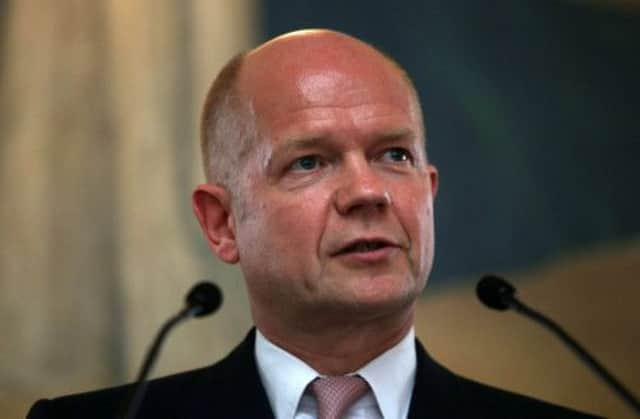Scottish independence would weaken UK - Hague


Speaking in Edinburgh on Thursday prior to a visit to the United Nations next week, Mr Hague said the remainder of the United Kingdom would be “hindered” in its ability to lead on major international efforts promoting human rights or campaigning against sexual violence in war zones.
The UK would keep hold of its permanent seat on the UN Security Council, he said, but the “total sum” of what the nation could achieve would be reduced.
Advertisement
Hide AdAdvertisement
Hide AdHis comments follow a warning by the Commons Foreign Affairs Committee last year that the UK’s influence as a member of global top table would wane if Scotland voted to go its own way.
The report was dismissed by First Minister Alex Salmond, however, who argued that it was the “scale of your ambition, not the size of your country” that made a mark on the global stage.
Mr Hague also warned that Scotland would be faced with major hurdles after independence on the international front.
The UK would “always want” to support Scotland’s interests, he said, but he warned that within both the EU and Nato there could be no guarantees that other nations would be so forthcoming.
Mr Hague was speaking as he made his first major speech on the Scottish independence referendum. He argued that the UK’s foreign muscle provided Scotland with trade links, security and offered it a seat at the top diplomatic tables.
Mr Hague noted a recent survey which suggested Britain had been rated number one in the world for “soft power”, pointing to the impact of the Olympics on the country’s global brand.
On the impact of independence on remainder of the UK, he replied: “I think we would all be diminished. There we are at the moment No1 in the global ranking [for soft power]. Whether we’re first in the world or second or third, we far outweigh our size in the world through our combined presence and influence.”
He added: “If that was to be fragmented, the total sum of that would be less. I think we have to confront that fact. They should know that would hinder our ability to pursue human rights issues, our ability to deliver good development in many of the poverty-stricken countries of the world, our ability to campaign against sexual violence in conflict. These would be diminished if the United Kingdom was diminished.”
Advertisement
Hide AdAdvertisement
Hide AdHis comments come with diplomats and international experts having questioned whether the impact of Scottish independence might be to place pressure on the UK’s permanent seat at the UN’s Security Council. The Foreign Affairs Committee at Westminster concluded last year that “some degree of reputational damage is inevitable”.
Mr Hague said he believed that the continuing UK would “retain” its permanent membership on the council, which gives the UK a veto along with the United States, China, France and Russia. But he claimed Scotland would definitely no longer be represented.
Speaking after the speech, he said: “It’s me, a Yorkshireman, sitting at the Security Council next week but it was Robin Cook sitting at the Security Council not so many years ago.”
After independence, he insisted that the UK “wouldn’t be hostile” to Scotland’s interests, but he added that Scotland would be in a “difficult position” as regards membership of both the EU and Nato, given that applicants require unanimous backing from existing members.
He said that Scotland would have to apply for membership of NATO. “I think that would then be complicated, putting it mildly, by the SNP’s position, if that was the position of the Scottish Government, on nuclear weapons. The possession by NATO of nuclear weapons is part of the strategic concept by which all NATO members abide and support. So there would be, at the least, a complication.”
On the EU, he pointed to the potential objections of countries such as Spain, which is presently resisting a growing independence movement in Catalonia. He said: “There are other countries (within the EU) who are very concerned about their own national unity and would have their own interest in demonstrating that it is not easy to join the EU if you leave one of the member states. Don’t under-estimate how anxious they are about that and how determined they would be to prove that point”.
Mr Salmond, however, said earlier this year that influence was dictated by “the strength of your economy and the vigour of your ideas and the friendships we have built up”, not by size alone.
On Scotland’s status after a yes vote next year, Angus Robertson, the SNP’s defence spokesman added: “150 countries have become independent since 1945 and countries around the world more than understand the principle of being responsible for your own decisions. As an independent country Scotland will be one of richest countries in world and we will play an active part in the world.
Advertisement
Hide AdAdvertisement
Hide Ad“As the achievements of other countries show influence is not about size, it’s about working together and how you use the powers that you have.”
He went on: “Independence offers us the opportunity to make Scotland’s place in the world one that meets the aspirations of our people.”
SEE ALSO: